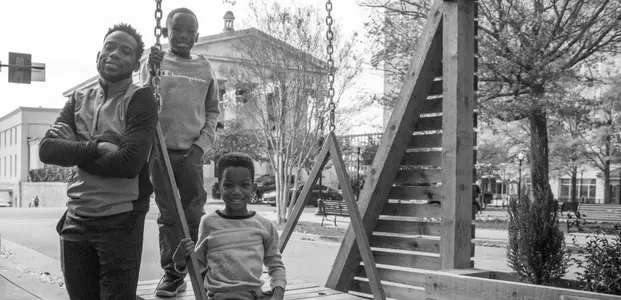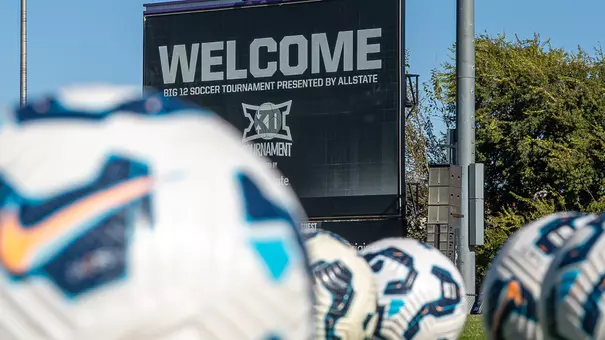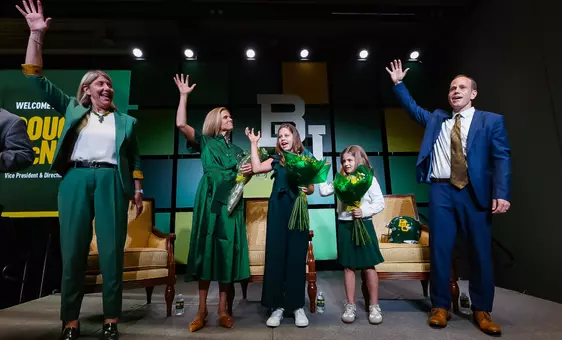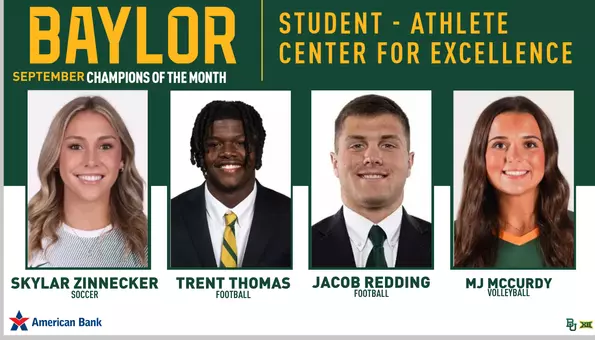
CLIMBING THE NEXT MOUNTAIN
1/25/2022 4:08:00 PM | General, Student-Athlete Center for Excellence
After Move From UAB, Cooper Thriving as Associate AD for Academic Services
By Jerry Hill
Baylor Bear Insider
Ramone Cooper was good enough on the track at Bob Jones High School to run for an NCAA Division II program at the University of Alabama in Huntsville.
And while he ran the 100- and 200-meter sprints, he says his specialty was actually "staying injured."
"I'll be honest, I could not shake injuries," said Cooper, who's in his first year at Baylor as Associate AD for Academic Services. "I still remember being injured going into our state championships in high school and never fully recovering. For two years, I was plagued by hamstring injuries, and that's what led me to hang it up."
That's also when he decided to transfer to Tennessee State University in Nashville and potentially pursue a career as an athletics trainer. At least for a minute or two.
"I thought, because of the injuries, I'm going to do athletic training," he said. "Thank goodness for opportunities to serve as a student employee. I learned very quickly as a student trainer that that was not going to be the route for me. But, it was a good experience."
For one, it showed him that "there's got to be something else out there for me within the world of athletics."
"I just thought that the athletic training piece was going to work itself out, and that's where I was supposed to be," said Cooper, who graduated from Tennessee State in 2009 with a degree in human performance and sports science. "But, I think God probably had different plans for me."
Cooper's scope grew exponentially at the University of Louisville, where the master's program in sport administration introduced him to "so many different areas of discipline" in the world of athletics.
 "That's where I got my foot in the door in academics," said Cooper, who started on the ground floor as a tutor. "I tell everyone now, young professionals, 'It's OK to get on administrators' nerves, as long as you do it in a way that shows that you're passionate about this.' That's all I did. I just stayed in that office and bugged people until I got a shot."
"That's where I got my foot in the door in academics," said Cooper, who started on the ground floor as a tutor. "I tell everyone now, young professionals, 'It's OK to get on administrators' nerves, as long as you do it in a way that shows that you're passionate about this.' That's all I did. I just stayed in that office and bugged people until I got a shot."
One of his mentors at Louisville was Chris May, who is now the Executive Director of Academic Services.
"He was one who saw that I was really serious about doing this as a profession," Cooper said. "He taught me everything I knew about continuing eligibility, as well as APR, Academic Progress Rate; how to really evaluate a student's degree audit; and how that translates into the NCAA eligibility rules and making it make sense."
After working predominantly with track & field and women's basketball as a GA at Louisville, Cooper's first full-time job was as the football academic advisor at Division II Towson University in Baltimore, Md. The advisor – as in one – for the entire football program.
"It's very rare in today's era to find one academic advisor dedicated to football," he said, "but that was my path. I was the one guy working football. But again, it was a great experience for me, because I think it prepared me for every stop after that."
At North Carolina State, Cooper went from a team of one to a team of five academic advisors for football.
"I got an opportunity there to help develop their freshman football program," he said. "They had a pretty robust summer bridge program there, so I got to be in on the foundation of that. It's expanded now, from my understanding, from what it was when I was there. My time at NC State was extremely short, but I did get to see two classes come in."
Making the move to the University of Georgia in 2014 as an academic advisor for football and volleyball, he was eventually elevated to Director of Academics as the "de facto No. 2" in the department behind Executive Senior Associate AD Ted White.
"Growing up in Alabama, it's probably a dream to work in the SEC," Cooper said. "But, I don't know how much my Alabama family and friends appreciated it, because my ties definitely switched."
With the promotion, Cooper was pulled away from directly working as a football academic advisor and took on the advising role with men's and women's basketball.
"It was good to get basketball and have a different sport with different challenges," he said. "I got to work with a couple different coaches at Georgia, too. Saw that transition from Mark Richt to Kirby Smart (in football). Saw the transition from Mark Fox to Tom Crean in men's basketball.
"And then, Andy Landers had not been too far removed from women's basketball when Joni Taylor took over. I'd say that's where my path to leadership in this space started was at Georgia, for sure."
One of the challenges at Georgia was working with football players at that level "who all think they're destined for the (NFL)."
"Particularly, just the way that our model was set up, we had a lot of students who were probably taking about 12 hours every semester," he said. "If there's one hiccup, it didn't really progress you to graduating in four years. It was more of a five-year model, which is fine. But, the real challenge was, these guys all wanted to declare after three (years). And you're still so far removed from graduating."
While Cooper was handling most of the day-to-day operations in Georgia's academic support area, he got the chance three years ago to "truly be that No. 1 in both academics and student development" as the Associate Athletic Director at UAB.
"I had oversight over both areas, so very comparable to (Marcus Sedberry's) role here," said Cooper, who also added a master's in business administration while he was at UAB.. "At that point, I relinquished all advising responsibilities, so truly became more of a senior leader within the academics and student-athlete development space. A little different structure there, where my office at UAB reported directly to the Vice Provost. So, I had a lot of connections and collaborations with campus partners and campus leaders."
In addition to his senior leadership role at UAB, Cooper also expanded his involvement in the areas of diversity, equity and inclusion (DEI). Following George Floyd's murder on May 25, 2020, he co-chaired Blazer Allies, an ongoing support arm charged with listening, education and developing strategic plans in the areas of DEI.
"I was pretty passionate about it," he said. "It was very much like our ONE campaign here at Baylor. We developed educational platforms, some activism and outreach, as well as voter registration. We also did "Lunch and Learn" sessions and monthly talks where we would either bring in speakers or maybe just do a roundtable discussion. And we also tried to push out educational resources every month as well."
Well before that, though, Cooper was involved in the Ethnic Concerns Committee for the National Association of Academic and Student-Development Professionals (N4A), developing a scholarship where members from HBCU, lower-resource institutions and Hispanic-serving institutions could afford to attend regional and national conventions.
Currently, he's serving as the Vice Chair for the Ethnic Concerns Committee and has helped the committee reach over 300 high school coaches, administrators, parents and students through their virtual programming.
Last August, he left a geographic footprint where he has spent the majority of his life to lead a 16-person academic services team at Baylor while also serving as a secondary sport administrator for track & field.
"It's been exciting to welcome Ramone to our SACE team and the Baylor Family," said Sedberry, Senior Associate AD for Student-Athlete Success. "He brings a wealth of experience in academic services and is considered to be a thought leader in our industry. His ability to jump right in and aid in supporting our student-athletes, coaches and staff have helped us continue academic excellence."
 One of the reasons for the move, Cooper said, was to get back to the Power 5 Conference level, "where I just feel like you're able to provide a lot more for your students when you have some of those resources and personnel."
One of the reasons for the move, Cooper said, was to get back to the Power 5 Conference level, "where I just feel like you're able to provide a lot more for your students when you have some of those resources and personnel."
Very much a planner, Ramone said his goal is to be a Senior Associate AD within the next five years and "we'll say Deputy AD for the 5-to-10 (year plan). I know you mentioned AD. We'll see what happens. Maybe that's the 10 to 15."
Outside of work, Ramone's true passion is his two sons, Trey (11) and Kaleb (7).
"Trey is the third, Ramone Cooper III, so he goes by Trey," Ramone said. "He's an avid football fan, loves it with a passion. When he finds a team he's real passionate about, he could look at a roster and probably tell you everything about everyone on the team.
"Kaleb is more the artist. Now, he's probably the better athlete. He could probably be very good, but he just does sports because his big brother does and his dad loves it. He loves drawing, painting, being creative. And he's a ball of energy."
Now, here's the crazy side of Ramone Cooper Jr., though. He has a serious fear of heights, but "absolutely loves" the high ropes courses and zip lining and has even taken up rock climbing at the McLane Student Life Center since moving to Waco.
"I like to push beyond my fears," he said. "It's easy to go up. The problem is when they tell you to come down. You look down, and they say, 'Oh, just let go, kick your feet off the wall and just drop.' And I'm like, 'Wait! What?'''
Baylor Bear Insider
Ramone Cooper was good enough on the track at Bob Jones High School to run for an NCAA Division II program at the University of Alabama in Huntsville.
And while he ran the 100- and 200-meter sprints, he says his specialty was actually "staying injured."
"I'll be honest, I could not shake injuries," said Cooper, who's in his first year at Baylor as Associate AD for Academic Services. "I still remember being injured going into our state championships in high school and never fully recovering. For two years, I was plagued by hamstring injuries, and that's what led me to hang it up."
That's also when he decided to transfer to Tennessee State University in Nashville and potentially pursue a career as an athletics trainer. At least for a minute or two.
"I thought, because of the injuries, I'm going to do athletic training," he said. "Thank goodness for opportunities to serve as a student employee. I learned very quickly as a student trainer that that was not going to be the route for me. But, it was a good experience."
For one, it showed him that "there's got to be something else out there for me within the world of athletics."
"I just thought that the athletic training piece was going to work itself out, and that's where I was supposed to be," said Cooper, who graduated from Tennessee State in 2009 with a degree in human performance and sports science. "But, I think God probably had different plans for me."
Cooper's scope grew exponentially at the University of Louisville, where the master's program in sport administration introduced him to "so many different areas of discipline" in the world of athletics.
 "That's where I got my foot in the door in academics," said Cooper, who started on the ground floor as a tutor. "I tell everyone now, young professionals, 'It's OK to get on administrators' nerves, as long as you do it in a way that shows that you're passionate about this.' That's all I did. I just stayed in that office and bugged people until I got a shot."
"That's where I got my foot in the door in academics," said Cooper, who started on the ground floor as a tutor. "I tell everyone now, young professionals, 'It's OK to get on administrators' nerves, as long as you do it in a way that shows that you're passionate about this.' That's all I did. I just stayed in that office and bugged people until I got a shot."One of his mentors at Louisville was Chris May, who is now the Executive Director of Academic Services.
"He was one who saw that I was really serious about doing this as a profession," Cooper said. "He taught me everything I knew about continuing eligibility, as well as APR, Academic Progress Rate; how to really evaluate a student's degree audit; and how that translates into the NCAA eligibility rules and making it make sense."
After working predominantly with track & field and women's basketball as a GA at Louisville, Cooper's first full-time job was as the football academic advisor at Division II Towson University in Baltimore, Md. The advisor – as in one – for the entire football program.
"It's very rare in today's era to find one academic advisor dedicated to football," he said, "but that was my path. I was the one guy working football. But again, it was a great experience for me, because I think it prepared me for every stop after that."
At North Carolina State, Cooper went from a team of one to a team of five academic advisors for football.
"I got an opportunity there to help develop their freshman football program," he said. "They had a pretty robust summer bridge program there, so I got to be in on the foundation of that. It's expanded now, from my understanding, from what it was when I was there. My time at NC State was extremely short, but I did get to see two classes come in."
Making the move to the University of Georgia in 2014 as an academic advisor for football and volleyball, he was eventually elevated to Director of Academics as the "de facto No. 2" in the department behind Executive Senior Associate AD Ted White.
"Growing up in Alabama, it's probably a dream to work in the SEC," Cooper said. "But, I don't know how much my Alabama family and friends appreciated it, because my ties definitely switched."
With the promotion, Cooper was pulled away from directly working as a football academic advisor and took on the advising role with men's and women's basketball.
"It was good to get basketball and have a different sport with different challenges," he said. "I got to work with a couple different coaches at Georgia, too. Saw that transition from Mark Richt to Kirby Smart (in football). Saw the transition from Mark Fox to Tom Crean in men's basketball.
"And then, Andy Landers had not been too far removed from women's basketball when Joni Taylor took over. I'd say that's where my path to leadership in this space started was at Georgia, for sure."
One of the challenges at Georgia was working with football players at that level "who all think they're destined for the (NFL)."
"Particularly, just the way that our model was set up, we had a lot of students who were probably taking about 12 hours every semester," he said. "If there's one hiccup, it didn't really progress you to graduating in four years. It was more of a five-year model, which is fine. But, the real challenge was, these guys all wanted to declare after three (years). And you're still so far removed from graduating."
While Cooper was handling most of the day-to-day operations in Georgia's academic support area, he got the chance three years ago to "truly be that No. 1 in both academics and student development" as the Associate Athletic Director at UAB.
"I had oversight over both areas, so very comparable to (Marcus Sedberry's) role here," said Cooper, who also added a master's in business administration while he was at UAB.. "At that point, I relinquished all advising responsibilities, so truly became more of a senior leader within the academics and student-athlete development space. A little different structure there, where my office at UAB reported directly to the Vice Provost. So, I had a lot of connections and collaborations with campus partners and campus leaders."
In addition to his senior leadership role at UAB, Cooper also expanded his involvement in the areas of diversity, equity and inclusion (DEI). Following George Floyd's murder on May 25, 2020, he co-chaired Blazer Allies, an ongoing support arm charged with listening, education and developing strategic plans in the areas of DEI.
"I was pretty passionate about it," he said. "It was very much like our ONE campaign here at Baylor. We developed educational platforms, some activism and outreach, as well as voter registration. We also did "Lunch and Learn" sessions and monthly talks where we would either bring in speakers or maybe just do a roundtable discussion. And we also tried to push out educational resources every month as well."
Well before that, though, Cooper was involved in the Ethnic Concerns Committee for the National Association of Academic and Student-Development Professionals (N4A), developing a scholarship where members from HBCU, lower-resource institutions and Hispanic-serving institutions could afford to attend regional and national conventions.
Currently, he's serving as the Vice Chair for the Ethnic Concerns Committee and has helped the committee reach over 300 high school coaches, administrators, parents and students through their virtual programming.
Last August, he left a geographic footprint where he has spent the majority of his life to lead a 16-person academic services team at Baylor while also serving as a secondary sport administrator for track & field.
"It's been exciting to welcome Ramone to our SACE team and the Baylor Family," said Sedberry, Senior Associate AD for Student-Athlete Success. "He brings a wealth of experience in academic services and is considered to be a thought leader in our industry. His ability to jump right in and aid in supporting our student-athletes, coaches and staff have helped us continue academic excellence."
 One of the reasons for the move, Cooper said, was to get back to the Power 5 Conference level, "where I just feel like you're able to provide a lot more for your students when you have some of those resources and personnel."
One of the reasons for the move, Cooper said, was to get back to the Power 5 Conference level, "where I just feel like you're able to provide a lot more for your students when you have some of those resources and personnel."Very much a planner, Ramone said his goal is to be a Senior Associate AD within the next five years and "we'll say Deputy AD for the 5-to-10 (year plan). I know you mentioned AD. We'll see what happens. Maybe that's the 10 to 15."
Outside of work, Ramone's true passion is his two sons, Trey (11) and Kaleb (7).
"Trey is the third, Ramone Cooper III, so he goes by Trey," Ramone said. "He's an avid football fan, loves it with a passion. When he finds a team he's real passionate about, he could look at a roster and probably tell you everything about everyone on the team.
"Kaleb is more the artist. Now, he's probably the better athlete. He could probably be very good, but he just does sports because his big brother does and his dad loves it. He loves drawing, painting, being creative. And he's a ball of energy."
Now, here's the crazy side of Ramone Cooper Jr., though. He has a serious fear of heights, but "absolutely loves" the high ropes courses and zip lining and has even taken up rock climbing at the McLane Student Life Center since moving to Waco.
"I like to push beyond my fears," he said. "It's easy to go up. The problem is when they tell you to come down. You look down, and they say, 'Oh, just let go, kick your feet off the wall and just drop.' And I'm like, 'Wait! What?'''
Baylor Basketball (W): Postgame at West Virginia | February 1, 2026
Monday, February 02
Baylor Basketball (M): Gritty Road Win at WVU | January 31, 2026
Monday, February 02
Baylor Basketball (W): Condensed Game at West Virginia | February 1, 2026
Sunday, February 01
Baylor Basketball (W): Highlights at West Virginia | February 1, 2026
Sunday, February 01



















